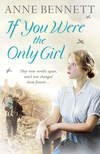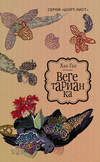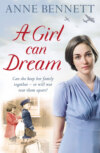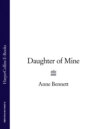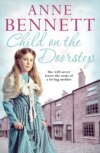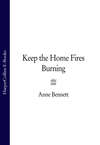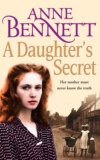Buch lesen: «If You Were the Only Girl»
ANNE BENNETT
If You Were the Only Girl

Copyright
Published by HarperCollinsPublishers Ltd 1 London Bridge Street London SE1 9GF
Copyright © Anne Bennett 2012
Anne Bennett asserts the moral right to be identified as the author of this work
A catalogue record for this book is available from the British Library
This novel is entirely a work of fiction. The names, characters and incidents portrayed in it are the work of the author’s imagination. Any resemblance to actual persons, living or dead, events or localities is entirely coincidental.
All rights reserved under International and Pan-American Copyright Conventions. By payment of the required fees, you have been granted the non-exclusive, non-transferable right to access and read the text of this ebook on-screen. No part of this text may be reproduced, transmitted, downloaded, decompiled, reverse engineered, or stored in or introduced into any information storage and retrieval system, in any form or by any means, whether electronic or mechanical, now known or hereinafter invented, without the express written permission of HarperCollins.
Source ISBN: 9780007359233
Ebook Edition © January 2013 ISBN: 9780007383702
Version: 2017-09-08
I would like this book dedicated to Judith Kendal in recognition of the many things she has done for me in our twenty-year friendship.
Contents
Title Page
Copyright
Dedication
Chapter One
Chapter Two
Chapter Three
Chapter Four
Chapter Five
Chapter Six
Chapter Seven
Chapter Eight
Chapter Nine
Chapter Ten
Chapter Eleven
Chapter Twelve
Chapter Thirteen
Chapter Fourteen
Chapter Fifteen
Chapter Sixteen
Chapter Seventeen
Chapter Eighteen
Chapter Nineteen
Chapter Twenty
Chapter Twenty-One
Chapter Twenty-Two
Chapter Twenty-Three
Chapter Twenty-Four
Chapter Twenty-Five
Chapter Twenty-Six
Chapter Twenty-Seven
Chapter Twenty-Eight
Chapter Twenty-Nine
The Aftermath
Acknowledgements
About the Author
By the same author
Keep Reading – If You were the Only Girl
About the Publisher
ONE
Lucy Cassidy saw Clara O’Leary for the first time that she could remember that dull Sunday morning in late October as they were leaving the Sacred Heart church in Mountcharles, County Donegal, after early Mass. Clara was her mother, Minnie’s, oldest friend.
‘Since we were girls,’ her mother had told Lucy. ‘Even after we married we were friends, and then when you were born just a fortnight after her daughter, Therese, we were so happy to be young mothers together.’
Then Clara’s husband, Sean, developed typhus. He was a strong man, however, and was fighting the illness, but Therese caught it from him, quickly grew very ill and died on Lucy’s birthday.
‘Every year I think of that,’ Minnie said. ‘Sean had got over the worst and was recovering, but at the death of his small daughter it was as if he had given up and a fortnight later he died too.’
‘And that’s when her brothers took Clara O’Leary back to England?’ Lucy would prompt, though she knew the story well.
‘After Sean’s funeral,’ Minnie said with a nod. ‘And she’s never been back until now. Of course, it was a terrible tragedy and I don’t think you ever really get over a thing like that.’
Lucy thought privately that Clara O’Leary looked as if she had got over it well enough, for she was so elegant. Only the few very rich in Mountcharles’s parish could afford such clothes as she wore. She even had fur mittens to match her hat. How Lucy, whose gloveless fingers would throb painfully in the winter months, envied her those. Clara’s grey melton coat had the same black fur around the collar and cuffs, and Lucy gave a little gasp when she caught sight of Clara’s warm-looking, snug-fitting boots. Any boots Lucy had were either too large or toe-pinchingly small, often leaky and always heavily cobbled. She looked down with a sigh at the battered boots that she had thrust her benumbed and stockingless feet into that morning before Mass.
Lucy could hardly believe that this woman was the same age as her mother. She looked years younger. She was a little plumper, and she had a kindly face with pink-tinged cheeks and bright blue eyes. Her hair wasn’t grey-streaked but dark blonde and caught up in an elaborately woven bun at the nape of her neck, fitting so tidily under the hat.
As Clara drew nearer, Lucy saw her blue eyes widen with surprise as her mother introduced all of them: Lucy herself, and Danny, who was two years younger than she was, her nine-year-old sister, Grainne, and her two young brothers, Liam and Sam, who were seven and five.
Clara, observing her friend’s eldest, wasn’t merely surprised, she was totally shocked because Lucy was so thin and small, the size of a child of ten or eleven. She had seen her standing with the others, but had assumed she was a younger sister to the child she remembered. Lucy’s tawny-coloured hair was thin and straggly, and her deep brown eyes stood out in a face that was so gaunt it was like looking at a very old woman.
Lucy shifted her feet a little at Clara’s scrutiny, well aware that though she was wearing the smartest clothes that she possessed, her coat was far too short, the sleeves barely reaching her bony wrists, and she had a struggle to fasten it across her chest. Beneath the coat was a thin dress, which was also far too short, and with all the goodness washed out of it, totally unsuitable for the weather, even with the threadbare, darned cardigan she wore over it.
Clara took all this in, noting as well how the arms and legs of all of the Cassidy children were stick thin, and pity washed over her. But she pushed it away before she addressed herself to Lucy in a cheery way. ‘Well, well, Lucy, I last saw you as a toddler, running and tumbling about the place, and here you are, almost a young lady. You will be fourteen now, won’t you, my dear?’
Lucy gave a little bob of her knee and tried to smile at the woman her mother set such store by, and it tore at Clara’s heartstrings as she said, ‘Yes, Mrs O’Leary, just last week.’
Clara knew that Minnie’s husband, Seamus, had died six months before, for the old friends wrote to each other often, and Clara knew too that she should have come home and not just sent a Mass card, but she never dreamt that the family would be reduced to such penury so quickly. She also had a sense of unease when she saw the shabby state of the sparse cottage, which was none too warm, though Minnie soon poked new life into the fire and threw on more turf, causing a flickering glow to develop under the porridge she had left cooking in a large double pan.
‘Take off your coat,’ she said to Clara, ‘or you’ll not feel the benefit when you go out – Lucy will lay it on the bed in the room – and then come up and sit here before the fire. I will have it ablaze in a moment.’
Clara did as she was bid and watched Minnie swinging the kettle above the heat of the fire as she took the porridge pan off the hook. Clara was shaken by how little of the thin porridge was ladled into the children’s bowls laid ready. Minnie had none herself but she made tea for them both.
‘And I have some soda bread too,’ she said. ‘It would be a poor day altogether when someone is offered a bare cup of tea in my house.’
Lucy’s mouth watered at the thought of soda bread spread with butter, for the porridge did little to fill her up. She knew that’s all there was, though, and she suppressed the sigh and watched her mother making tea and slicing and buttering the precious loaf.
Clara heard the slight release of breath and saw the children watching her, the younger ones, eyes alive with hunger, but when she tried to refuse the bread, Minnie turned from the fire and looked at her friend steadily.
‘Leave me some pride, for pity’s sake,’ she said. ‘God knows, I haven’t much else.’
Clara dropped her gaze as she mumbled, ‘I’m sorry, and you’re right. A cup of tea and some soda bread would be lovely.’
She said nothing more until this was set before her. Then she said, ‘First of all, Minnie, let me say how sad I was to hear of the death of Seamus. It must have been a heavy blow for you with five children to provide for.’
Lucy caught her breath. She still grieved for her father and her heart had an ache in it whenever she thought of him.
Her mother replied in a thin, watery voice, ‘It was, but, you know, in the end his death was a blessing because he was suffering so much. And he had been ill for such a long time.’
Lucy knew that only too well.
Casting her mind back while Clara and her mother spoke together, Lucy remembered that when she had been a small child, her father had seemed to be the strongest man in the world. He worked for Farmer Haycock and he was a hard worker and always gave of his best. He was made up to head cowman, and would have been given a cottage too, but Minnie had inherited one from her parents when they died and as it was only a couple of miles away from the farm they decided to stay there. Many times Minnie was thankful for that decision, for once Seamus grew too sick to work, they would have had to leave any farm cottage so another cowman could live in it.
Lucy was not aware of this at the time; she came to that realisation as she grew. As a young child she knew only that when her father came home from work the house became alive. She would fall upon him as soon as he was through the door, and in time Danny did too. Their father would toss the children in the air with ease and they would scream with delight. There was a lot of laughter in their house then, and a lot of singing. Both Seamus and Minnie loved the old songs they had learnt from their parents, and Lucy loved to hear them because it made her feel happy, safe and secure.
‘It was when I was expecting Sam that I first realised that the cough Seamus developed after a bad cold was still bothering him,’ Minnie said. ‘I didn’t take that much notice at first. Seamus always claimed he was fine and, as he said, everyone has a cough now and again, but his didn’t clear up and he would be grey-faced when he came home from work. The children were confused because he wasn’t able to play with them any more. All you could hear in the evening was the rasping sound of his chest and the relentless cough but we had no money to spend on doctors. I started to grow vegetables in the back garden because I couldn’t think what else to do. My priority was feeding the children and keeping the lot of us out of the poorhouse. By the time Sam was born, Seamus was too ill to work and in the end I had to find the money to have the doctor in.’
Lucy remembered the night the sounds from her parents’ bedroom wakened her and she had slipped out of the bed that she shared with her sister and ran across the landing, soon joined by Danny, still flushed from sleep, his hair tousled. Minnie was standing in the bedroom doorway, her hand to her mouth, her eyes wide with shock, and Lucy saw there were splashes of blood on her threadbare nightgown. Then she saw her father on the bed making guttural noises as the blood pumped from him in a scarlet stream. The spasm was over when the doctor arrived, but the evidence was there for him to see.
Lucy heard him tell her mother that her father’s first haemorrhage was unlikely to be his last because he had TB, which was highly infectious.
‘Keeping him at home any longer is madness,’ the doctor had barked. ‘You are risking your own life and that of your children. You must agree that Seamus is taken to the sanatorium immediately or you are risking your whole family being wiped out with it.’
‘Seamus said he must go when he heard what the doctor said,’ Minnie told Clara now. ‘None of the children saw him again and he lasted only six months after that.’
‘Ah, yes,’ Clara said in agreement. ‘It’s hard to see them suffer.’
‘Well, you would know about that, of course.’
‘Yes,’ Clara agreed, ‘and the memories were raw in the beginning, but I wasn’t the only one to suffer a loss. There is only one thing to do and that is to go on as you are doing and fulfill your intention of keeping the children alive and out of the poorhouse.’
‘Aye, so far,’ Minnie said. ‘Sometimes, though, I feel as if I’m balanced on a knife edge. You went to Birmingham and made a new life for yourself – made up from lady’s maid to housekeeper within three years.’
‘The aftermath of the Great War helped me there,’ Clara said. ‘The war had given women and girls greater opportunities and after it fewer girls were looking for “in service” work.’
‘Did you not mind going to live with strangers?’
‘Not really,’ Clara said. ‘My brothers were very kind to me but I knew I couldn’t be beholden to them and their wives for ever. By taking a job in service I had a roof over my head, clothes on my back and plenty to eat, and though the wages weren’t much to start with, they have improved with time. And that is where I can help you, Minnie, I am looking for a new scullery maid and your Lucy is of an age to work.’
‘In Birmingham?’ Minnie cried. ‘I could never countenance her being so far away.’
‘Now would I ask you to?’ Clara said. ‘I know how precious daughters are. But this is the beauty of it. The Master of the house where I work, Lord Charles Heatherington, was a general in the army and was recently badly hurt in a skirmish in India. He spent months in hospital and eventually insisted on being shipped home where he said he could be nursed just as well. I would say he was right, too, because he is cared for by his batman, a man called Rory Green, a taciturn Scot who is devoted to the Master. Anyway, the Mistress decided that a change of scene and peace and quiet are what her husband needs now and they have taken charge of a large house in its own grounds, a place called Windthorpe Lodge, just outside Letterkenny.’
‘Donegal Town is a long way from there.’
‘That doesn’t really matter,’ Clara said. ‘All the positions are “live in”, you see. I have a housemaid and a kitchen maid, both a bit older than Lucy, and I am short of a scullery maid.’
Clara knew that she didn’t need to be short of a scullery maid, that she could have filled the post ten times over, but though in her letters Minnie never moaned, Clara had known things would be tight after Seamus died and she often worried that she could offer her friend no help. Then Lady Heatherington started making plans to decamp to the North of Ireland for a while and Clara thought straight away of helping her old friend by offering Lucy employment.
‘I never thought of Lucy doing that kind of thing,’ Minnie said.
Clara hid her impatience and asked instead, ‘What had you in mind?’
Minnie shook her head. ‘You lived here,’ she cried, distressed. ‘You know there is little employment for young girls.’
Clara put her hands over Minnie’s agitated ones and said, ‘Please, listen to me, Minnie. Lucy’s job could lift you out of the extreme poverty you are in at the moment. You would have one less child to feed or find clothes for, and she will be paid eight shillings a week, a goodly portion of which I know she will want to send to you.’
Minnie cast an anguished glance at Lucy as if she could hardly believe what she was hearing. ‘But when will I see her?’ she cried.
‘Well,’ said Clara, ‘in Birmingham the scullery maid has two half-days a week off and one full day every month. It will probably be the same here. Not that she’ll be able to see you on her half-days.’
‘Not on her full day either,’ Minnie said. ‘Letterkenny is a fair step from here.’
‘But the rail bus goes all the way,’ Clara said.
Lucy knew what she was talking about: the little bus that ran on rails, which she had seen many a time, though she never thought that she would ever have the opportunity to ride on it.
‘Lucy’s never been on a rail bus,’ Minnie said. ‘None of us has.’
‘Well, that can be remedied,’ said Clara with a smile. ‘That’s how I travelled down and how I will go back in a day or so. And remember that while Lucy will be far from home, I will be there to look after her as if she were my own daughter. What d’you say, Lucy?’
Lucy knew what she wanted to say: that she didn’t want to go so far away from home to work. What Clara said was a shock and not just to her but to all her siblings.
Sam’s eyes had filled with tears because Lucy had done a lot of the rearing of him. ‘Lucy’s not to go anywhere,’ he cried to Clara in protest. ‘She’s not to. She lives here with us.’
Danny thought the same. He and Lucy were very close, but he knew when adults decided something that was that. Grainne was dismayed that she would be losing the big sister that she looked up to so much and left with just the boys for company, and even Liam felt a bit sniffy at the thought of Lucy going away.
Clara looked at the saddened faces around her, Sam’s still red with temper and Lucy’s eyes sparkling with unshed tears, and she said, ‘I see that wasn’t a very popular thing to say.’
‘You shan’t take Lucy away,’ Sam said belligerently. ‘You shan’t because I’ll not let you.’
‘That will do, Sam,’ Minnie said.
‘But—’
‘Enough, I said. You are being rude.’
‘Lucy must work someplace, you know, now her school days are over,’ Clara said to the children. She went on to describe the big house just outside Letterkenny and the benefits for them all if Lucy were to take a job there.
As Clara spoke, things became much clearer to Lucy too. She was no keener to leave home but she knew that for all their sakes she must go and be a scullery maid at this house and lift some of the burden from her mother.
For years Lucy had listened to Minnie in the garden from early morning till late at night, digging, planting, hoeing, weeding, watering and then harvesting. Any surplus was exchanged for oatmeal, flour and fats and candles at the shop, and Lucy knew that it was time now for her to contribute to the family. She nodded her head to Clara. The younger children stared at her open-mouthed, but Danny had known all along what the outcome would be.
Then Clara asked Lucy, ‘Is that your best dress?’ She knew the answer really. She had seen how the others were dressed.
Minnie’s face flamed with embarrassment but she answered firmly enough. ‘Sometimes there is barely enough money to put food on the table and there is none to spare for new clothes. St Vincent de Paul come round with a bundle of things sometimes, but ours is not the only poor family in Mountcharles. There has been nothing suitable for Lucy in the bundles lately.’
Clara knew that she would have to tread carefully. Minnie set a great store by pride. ‘Don’t fret about it,’ she said. ‘The family will provide Lucy’s uniform – a grey dress and various aprons – though they will have to be altered to fit.’
‘She’s handy with her needle,’ Minnie said. ‘I have taught her that much. But if her uniform is provided why does her normal dress matter?’
‘Lady Heatherington expects a certain standard of dress among her staff,’ said Clara. ‘So that if they should choose to walk about the town on their time off and certainly on Sundays when we go to Mass we shall not disgrace the house.’
‘Then I don’t know what is to be done.’
‘Let me buy Lucy a couple of dresses.’
Lucy caught her breath in a gasp of pleasure, for she could never remember having new clothes before. However, Minnie was shaking her head. ‘I couldn’t possibly let you do that.’
‘Why not?’ Clara demanded. ‘Stiff-necked pride again?’
‘As I said before, it’s all I have.’
‘You are denying Lucy a chance in life,’ Clara said angrily. ‘And denying all of them the opportunity to make their lives even the tiniest bit easier because of some crackpot notion you have. Have you the right to do that?’
Lucy saw her mother was wavering and so did Clara, and she went on more gently, ‘Minnie, you said you will miss Lucy sorely when she is gone from you and I am sure you will, but I would give my eyeteeth to be in that position and able to see my daughter every month. Now you are my dearest friend, and it would ease my soul to buy the clothes needed for your daughter. Surely we have been friends too long for you to feel awkward about it?’
There was only one way to respond to that, and when Minnie inclined her head, Lucy let out the breath she was unaware she had been holding.
‘But how will you get the things so quickly?’ Minnie asked. ‘You’ll have to choose the material and contact the dressmaker.’
‘There is no need for that now,’ said Clara. ‘You can buy things off the peg.’
‘Not in Mountcharles, you can’t.’
‘No, but we’ll probably be able to in Donegal Town,’ said Clara. ‘There is a large store called Magee not far from the Abbey Hotel where I am staying.’
The whole family looked at her, stunned. Though Donegal Town was only three or four miles away, none of them had ever been there. In fact, Lucy hadn’t been further than Mountcharles all the days of her life, and here was Clara talking blithely about a hotel in the town where she was staying and taking her to a big store to buy her clothes. It was totally beyond her understanding.
‘How will you get there?’ Minnie asked. ‘Walk?’
‘No,’ Clara said, ‘I thought we’d take the rail bus. They have really opened up the North of Ireland. We can pick one up at the halt in the village and be in Donegal Town in no time at all. Now,’ she said to Lucy, ‘I will be here bright and early tomorrow because I must leave on Tuesday. The family are arriving at the weekend and it’s my job to make sure everything is ready for them.’
Lucy knew Danny would have given his eyeteeth to be the one travelling on the rail bus the following morning. She would never admit it to him or anyone else, but at first she had been a bit worried that the rail bus would jump off the tracks and that she would be thrown out of it, especially as it seemed to go at such speed.
However, she soon got used to it and watched the countryside flashing past as Clara told her all about the people she would be working with.
‘It’s not a large household,’ Clara said, ‘and some have come with us from the house in Birmingham, like the General’s batman, and the butler and footman. Now, the footman goes by the name of Jerry Kilroy. He has a shock of ginger hair, and green eyes like a cat, and he usually has a large grin on his face, remembering some devilment he has been at. He is an impudent scamp, not averse to pinching the girls’ bottoms.’
Lucy’s eyes opened wider. Clara said, ‘I think we won’t tell your mother that and I’m sure you can deal with him very effectively. You may have to join forces with Clodagh Murray – she’s the new kitchen maid that I have engaged – or Evie McMillan, the housemaid. Between you all I’m sure you will teach him a lesson he will not forget in a hurry.’
‘Yes,’ Lucy said, but she said it uncertainly; then added, ‘So, Evie is new too?’
Clara nodded. ‘The parents of the younger girls didn’t want them so far away,’ she explained. ‘The cook, Ada Murphy, came with us, of course, and Norah Callaghan, Lady Heatherington’s personal maid. But come on,’ she said as the rail bus pulled into Donegal station, ‘we’re here.’
Lucy knew straight away that Magee was the type of establishment that wouldn’t welcome the likes of her through the doors. She saw one saleswoman’s sidelong look at another as Clara pushed open the big glass doors and stepped inside. Their attitude turned completely, however, when they realised that Clara was actually going to spend money. She soon chose two winter-weight dresses for Lucy. One was in a plaid design with fancy buttons up the bodice and what the assistant described as a Peter Pan collar, and the other was navy blue with a cream trim and the skirt pleated all the way round. To wear underneath she bought two flannelette petticoats and three sets of underwear, also three nightgowns and three pairs of stockings, and a navy cardigan because she said the attics in the big house could get very cold.
‘Oh, Mrs O’Leary …’ Lucy gasped, almost overcome with pleasure.
However, Clara wasn’t finished, for she bought Lucy boots made of the softest leather, which fitted snugly around her ankles, and a navy-blue coat and matching bonnet, scarf and gloves. She insisted Lucy wear the new coat and the bonnet, scarf and gloves while the assistant wrapped up the old shabby old coat and packed it with the other things into the new case that she had also bought. She had known that there wouldn’t be one in the house because the Cassidys would have had no need to buy one and, as she said to Lucy, she couldn’t go to her new place of work with her new clothes wrapped up in newspaper.
‘Now,’ Clara said, standing Lucy in front of one of the many mirrors in the shop, ‘don’t you look a picture?’
And Lucy did look a picture. In fact, she couldn’t believe that the figure in the mirror was her, and she turned to Clara with her eyes shining. ‘I … I don’t really know what to say,’ she said. ‘I mean, thank you, of course, but that doesn’t seem half enough for what you have done for me.’
‘All I’ve done is buy you a few clothes,’ Clara said as they left the store. ‘And I have enjoyed it probably as much as you have. Now, I don’t know about you but I am starving and so I say we find some place to have dinner. That all right by you?’
Lucy’s mouth had dropped agape, for she had never eaten out before. ‘You … you mean dinner in a café somewhere?’
‘That was the idea, yes.’ Clara’s smile was warm.
Lucy felt as if she had died and gone to Heaven a little later, after a meal of steak-and-kidney pie, with potatoes, carrots and cabbage and lots of gravy, followed by treacle tart and custard. Clara thought she had never treated anyone who was so appreciative, and she smiled with satisfaction.
Before they made for the rail bus, she bought a large cooked ham at the butcher’s, two loaves of bread, creamery butter, a pot of jam, a huge slab of cheese, proper milk and tea.
Minnie cried when she saw all Clara had bought – the bountiful food on the table and the clothes and suitcase – and when Lucy tried on the clothes for them all to see, she cried afresh and burnt with shame that she had not been able to dress her own daughter or any of them half as well.
‘Now, that will do,’ Clara chided Minnie gently. ‘I have no daughter of my own to spoil and it’s the God’s honest truth that I enjoyed every minute of the time I spent with yours. Now, are we going to sit here weeping, or eat this fine food, for the children’s eyes are standing out of their heads as if on stalks?’
The young Cassidys had never smelt, never mind tasted, such wonderful food, and they did give full justice to the meal.
‘Now remember, I return tomorrow,’ Clara said to Minnie as she prepared to leave. ‘And Lucy must be on the first rail bus next Monday morning. The other two girls are starting this Wednesday because we really want them licked into some sort of shape before starting anyone else new.’
Lucy nodded but, when Clara had left, she was filled with doubt that she would be able to do the job of scullery maid. But she also knew that she had do her best, for the family would be relying on her, and she sighed, suddenly feeling the burden a heavy one.
